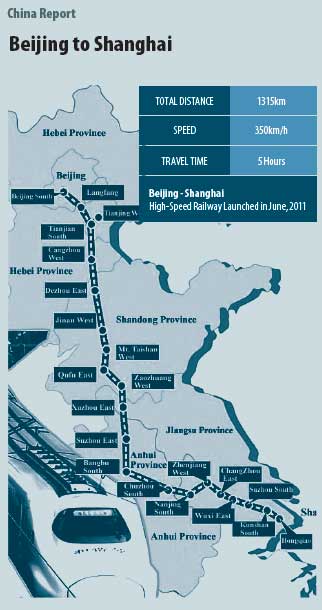|

Pros and cons
"The boom of HSR brings us new experiences and convenience," Zhu told ChinAfrica. However, not everyone is as thrilled as Zhu at the prospect of making tracks to her destination. Ning Kun, a newly graduated university student whose hometown is in Baoding, a one-hour trip from Beijing, has a different view on it. Ning is going to work in Shanghai in August. "As for us new grads, we care more about the price of travel rather than the speed or whether it is comfortable or not," he told ChinAfrica, adding that he will still use the older trains.
Professor Zhao Jian with School of Economics and Management of Beijing Jiaotong University echoes Ning in this regard. "It is unnecessary for the railway authority to solely pursue high speed. Actually, many passengers prefer regular trains that depart at night and arrive in the morning, as they will save the money of staying in hotels. For those who are not in a hurry, these trains are more economical." He further explained that the price of high-speed trains is still expensive for many people as China's per-capita income is low according to the international standard.
Yang Xiaoguang, Professor with School of Transportation Engineering of Tongji University, said with more stations and lower prices, regular trains are always the first choice for many passengers, especially those migrant workers and students. "The Ministry of Railways should keep such trains for the convenience of people who are cash-strapped. By doing so, the public can benefit fully from rail travel," Yang told Economic Herald.
The ministry responded at the media briefing on June 26 saying that it is set to meet the multi-demands of passengers. "For the Beijing to Shanghai line, after the high-speed trains entered into operation, while reserving the existing 136.5 pairs of passenger trains running between Beijing and Shanghai every day, we will add five more," said ministry spokesman Wang Yongping. According to Wang, with the high-speed line in operation, the seating capacity of trains running between Beijing and Shanghai will increase 97,000 to reach 319,000. In addition, passengers will have more traveling options, with seven types of trains, like through-express train, special express train, regular train and slow train. "This arrangement satisfies passengers with different needs," he said, adding that future HSR lines constructed elswhere would see the Beijing-Shanghai line as an example for train scheduling.
But, it is reported that some regular trains were canceled on some lines when HSR trains began operating. According to a report from Xinhua News Agency, about 13 pairs of regular trains from Wuhan to Guangzhou were canceled when the Wuhan-Guangzhou High-speed Railway opened in late 2009.
Safety guaranteed
Another big issue of concern about the HSR is the safety. Sheng Guangzu, Minister of Railways, announced that all trains in the HSR network would operate at a maximum speed of 300 km per hour. The Beijing-Shanghai high-speed trains are required to operate at two speeds of 300 km per hour and 250 km per hour instead of the previously designed 350 km per hour. This change led people to question the safety of the train.
In response to this concern, the ministry clarified in the media briefing that the reduction in speed had nothing to do with either safety or technical capability of the trains or the tracks. "Taking into consideration the passengers' demands, transporting capability, economic returns, saving of energy and lowering of cost, we decided to reduce the train speed," He Huawu, Chief Engineer of the Ministry of Railways, told media.
|